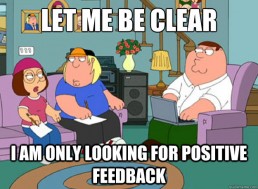Key to negative feedback: be constructive
Feedback is one of the words I use and hear a lot. It looks like everybody knows what it means, how important it is. Then, why is it so hard sometimes to give it and accept it? I don't know if you like by the book definitions, but I'll give you one:
In an organizational context, feedback is the information sent to an entity (individual or a group) about its prior behavior so that the entity may adjust its current and future behavior to achieve the desired result.
(a definition from www.businessdictionary.com)
Key to negative feedback: be constructive
There are two types of feedback, positive and negative, both valuable and effective. We have a constant need of knowing where we stand, how do we do our job and how can we maximize our potential.
While it is more convenient to give and receive positive feedback, we might avoid giving the negative one. But this is one of the most important tools to develop employees.
No matter if we talk about positive or negative feedback, it has to be constructive so that it brings an improvement to the receiver's behavior. Feedback should be:
- specific
- realistic
- well intended
- timely
- shouldn't be judgmental
When it is expressed as I mentioned above, it will motivate and should lead to performance improvement.
If what's communicated sounds as criticism, it's too general and doesn't refer to a specific situation or example, it will demotivate us. It is much easier or at hand to 'attack' with words than it is to deliver the message in a diplomatic, non-aggressive manner.
What's the context where a employee can give or receive feedback? We encourage our colleagues to have One on One Meetings with their managers.
1:1s are a chance to give and receive regular feedback, to develop a stronger connection between the two and a way to have in control the problems which may occur in a working environment. We see them as meetings that should be scheduled by the employee, but a manager can do it do. It should happen once a month (still working on improving their frequency in our company). All kind of subjects can be on the agenda: performance, career development, other professional or personal issues.
Of course feedback doesn't happen only in a formal meeting, it is a daily thing even though we might not be aware of it.
I'll leave now you with an intriguing affirmation I read. Feedback's role is to make employees do the job better, it is not to make them feel better. Do you agree with this statement?
